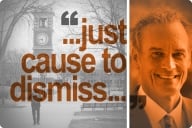You have /5 articles left.
Sign up for a free account or log in.
The Non-Faculty Manual and Orientation Guide
Introduction
This manual and orientation program was developed with input from seasoned faculty and non-faculty members alike over the course of two years in a highly collaborative and iterative process.
As a new non-faculty employee, it is essential to remember higher education has its own unique culture that you may find challenging and hard to navigate. Even with the best intentions, you may be interacting with faculty members in ways that are unintentionally counterproductive or even insulting. It should be noted that faculty members are serious and skilled debaters who take pride in challenging others. Please try not to take it personally.
Due to the nature of tenure, faculty also have long memories of interactions and can recall any previous conversation in minute detail several decades later. Hence, we believe it is advantageous for non-faculty employees to start on the right foot. Comments, questions and behaviors to be avoided at all costs are detailed here within.
After reading the manual, you will be required to attend an exciting orientation session with role-playing, roundtable discussions and PowerPoint presentations. A fascinating panel discussion, "We Were Once Enemies; Now We're Friends," features long-serving non-faculty employees and tenured full professors (all who have spent their entire careers at the College) and rounds out the lively day-long session. Following these activities, new non-faculty employees will be required to take an online certification test (may be taken up to three times for a passing score) and complete a survey. Recertification will occur every two years.
Join us after orientation for refreshments at the Regal Beagle Lounge (cash bar and charcuterie) from 5:15-5:45pm.
We hope that this manual and associated programming will help facilitate the development of a fulfilling career in the higher education sector. Good luck and best wishes!
Sincerely,
Committee for Managing Faculty Expectations (C.O.M.F.E.)
C.O.M.F.E. MANUAL
Table of Contents
I. Small Talk
A. General Notes
1. Rookie Mistakes
a. Confusing astronomy with astrology
b. Thinking Manet and Monet are the same artist
c. Being relatable and talking about yourself
d. Trying to make small talk in the first place
e. Not noticing a "side-eye" or an "eye-roll"
2. Thinking on Your Feet
a. What to do if someone says they don't own a television
b. How to get a word into the conversation
c. The use of affirmative non-verbal communication
d. Feigning interest
e. How to end conversations that go long
B. Topics to Avoid
1. Administrative decisions
2. Athletics
3. The College's budget
4. The value of tenure
5. Academic freedom and freedom of speech
6. Religion
7. Politics
8. Walmart or any other mega-corporations
C. Remarks and Questions to Avoid
1. "It must be nice to have summers off."
2. "What did you do on break?"
3. "You teach Mondays, Wednesdays, and Fridays? What do you do on Tuesdays and Thursdays?"
4. "How many copies did your book sell?" or "How much do you sell your art for?"
5. "I understand you were on a sabbatical. Where did you go on your vacation?"
6. "I saw you riding your bike to campus. Don't you have a car?"
II. Requests to Avoid
A. General Notes
1. Asking faculty to do anything for "free"
2. Asking faculty to do anything they don't want to do
3. The definition of "dog and pony show"
4. When are faculty in the mood for requests?
B. Requests to Avoid by Department (partial listing)
1. Art: Digital cameras recommendations
2. Biology: Identification of bugs found in your office
3. English: Poems for special events
4. Geology: The schedule for lapidary courses
5. Museum: Using the decorative art collection as dinnerware at a departmental event
6. Physics: Holding a cocktail party in the particle accelerator laboratory
7. Theatre: Designing a costume for the mascot
8. Accounting: "Are there any students who can do my taxes?"
III. Managing Conflict
A. General
1. Why debate is futile
2. How any response can be used against you
3. Is there such a thing as a neutral response?
4. Employing the blank stare
5. Utilize gratitude to disarm criticism
6. Flattery as the great leveler
7. When to call campus police
B. Emotions to Avoid
1. Kindness and empathy
2. Anger
3. Fear
4. Vulnerability
5. Joy
C. Attitudes to Avoid
1. Confidence
2. A show of expertise
3. Optimism
4. Humor
5. Sarcasm and irony





